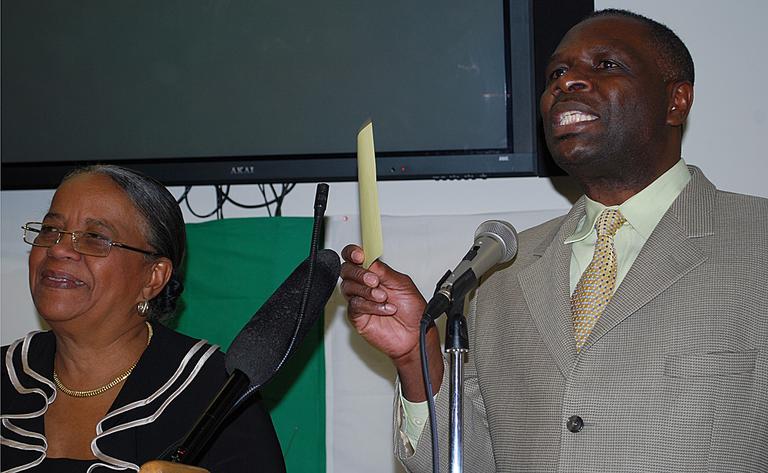Advertisement
Haiti's Presidential Candidates Campaign In Boston
Resume
Doctors in Haiti are fighting a devastating cholera outbreak and millions of people are still homeless after January's earthquake. Amid all of this chaos, Haitians will elect a president on Sunday.
Six of the 19 presidential candidates have come to Boston to campaign over the last several weeks. Candidates come here even though many Haitians here are naturalized U.S. citizens and therefore cannot vote in their homeland.
Mirlande Manigat is a 70-year-old college professor in Haiti. Her husband was president 22 years ago, and now she's trying to become the first woman to head the country.
Six of the 19 presidential candidates for Haiti have come to Boston to campaign over the last several weeks.
Manigat recently packed a Haitian senior center in Mattapan. She spoke for over an hour and answered dozens and dozens of questions until there weren't anymore. And — just like the five other Haitian candidates who've come here — she promised to give dual citizenship to Haitians living abroad if she's elected president on Sunday. Dual citizenship would allow Haitians who've become naturalized American citizens to vote in Haitian elections.
But if Haitians living abroad can't vote, why come all the way here?
"The electoral period is very short in time, it means that I will not have time to visit all of the 142 towns in Haiti. So I'm relying on them, those who live in Boston," Manigat says.
There are at least 55,000 Haitians living in Boston, and they come from all over Haiti. Manigat says they can reach areas by phone that she won't get to. She says Haitians living here are important for another reason.
"The Haitians who live in the United States, they have academic preparation," Manigat says. "They live in a democratic environment. In Haiti we do not have democracy — we are trying to build democracy — and I think that they can help."
It's hard to imagine that someone in one country would listen to relatives in another when it comes to voting preferences. Weekentz Guervil made an unsuccessful bid for congress in Haiti a few years ago. He explains the influence of Haitians living abroad a bit more crudely.
"As the saying says, who finances, comments," Guervil says.
"You mean, if I'm sending money to my mother in Haiti, I have the power to tell her who to vote for, that's what you're saying?" I ask Guervil.
"Yeah, that's tradition," he says.
Even before the earthquake, Haitians abroad were sending about $2 billion back to loved ones in Haiti — that was 26 percent of the country's gross domestic product.
Rich Innocent and his family have been part of that lifeline to Haiti. He was in Port-au-Prince during the earthquake in January and says he's watching the election closely. Innocent has no qualms about influencing the way his relatives vote.
"We're Haitian-American, however, it means a lot to us that this country progress," he says. "It is important they come by and see us, because we're the ones who keep this country rolling."
Just how much Innocent and other Haitian-Americans keep Haiti rolling will be apparent on Sunday — that's when they'll see if any of the candidates who came to court them become president of Haiti.
Related:
This program aired on November 24, 2010.